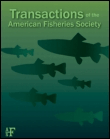
TRANSACTIONS OF THE AMERICAN FISHERIES SOCIETY
Scope & Guideline
Navigating the challenges of fisheries management with expertise.
Introduction
Aims and Scopes
- Fish Ecology and Behavior:
Research on the ecological interactions, behavioral patterns, and life history traits of various fish species, including studies on migration, feeding habits, and habitat utilization. - Population Dynamics and Genetics:
Investigating the population structure, genetic diversity, and reproductive strategies of fish species to inform conservation and management practices. - Impact of Environmental Changes:
Studies examining the effects of climate change, habitat alteration, and anthropogenic influences on fish populations and their ecosystems. - Fisheries Management and Conservation:
Research aimed at developing sustainable fisheries practices, assessing the impacts of fishing on fish populations, and evaluating management strategies. - Invasive Species and Biodiversity:
Exploring the effects of invasive fish species on native populations, community dynamics, and ecosystem function. - Technological Innovations in Fish Research:
Utilization of advanced methodologies such as acoustic telemetry, environmental DNA, and bioenergetics modeling to enhance the understanding of fish ecology.
Trending and Emerging
- Climate Change Adaptation Strategies:
Research exploring how fish populations and communities adapt to climate change is increasingly prominent, highlighting the need for adaptive management in fisheries. - Use of Environmental DNA (eDNA):
The application of eDNA for assessing fish presence and diversity is gaining traction, reflecting a trend towards non-invasive and efficient monitoring techniques. - Impact of Invasive Species on Ecosystems:
There is a growing emphasis on understanding the ecological consequences of invasive species on native fish populations and broader ecosystem dynamics. - Integration of Technology in Research:
Innovations such as acoustic telemetry and genetic tools are being increasingly utilized to study fish behavior, movement, and population dynamics in more sophisticated ways. - Bioenergetics and Physiological Responses:
Studies focusing on the bioenergetics of fish, particularly in relation to environmental stressors, are on the rise, indicating a deeper exploration of fish health and survival strategies.
Declining or Waning
- Traditional Fisheries Techniques:
There appears to be a waning interest in studies relying solely on traditional fisheries assessment methods, as the field increasingly embraces modern technologies and methodologies. - Generalized Studies on Non-native Species:
Research that broadly addresses non-native species without specific ecological or management implications has decreased, reflecting a shift towards more targeted and impactful studies. - Descriptive Studies without Management Implications:
Papers that provide purely descriptive data without offering insights into management or conservation have become less common, as the journal emphasizes actionable research.
Similar Journals
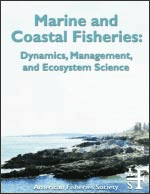
Marine and Coastal Fisheries
Navigating contemporary challenges in aquatic ecosystems.Marine and Coastal Fisheries, published by Wiley, is a leading open access journal that has been dedicated to advancing the field of fisheries science since its inception in 2009. With an esteemed Q1 ranking in Aquatic Science and a Q2 ranking in Ecology, Evolution, Behavior and Systematics as of 2023, the journal actively contributes to the understanding and management of marine and coastal ecosystems.
This journal serves a diverse audience ranging from researchers and practitioners to students, providing a platform for high-quality peer-reviewed articles that address contemporary challenges in fisheries management and conservation. With a commitment to global accessibility, Marine and Coastal Fisheries promotes the dissemination of scientific knowledge to enhance sustainable practices in marine environments, making it an essential resource for those invested in the health of aquatic ecosystems. To explore the latest research and insights, visit the journal's website and engage with the thriving community of marine science professionals.
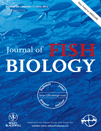
JOURNAL OF FISH BIOLOGY
Innovating Understanding of Aquatic EcosystemsJOURNAL OF FISH BIOLOGY, published by Wiley in the United Kingdom, is a distinguished peer-reviewed journal dedicated to advancing the understanding of the biology and relationships of fishes. With a robust history from its inception in 1969 to its future publications extending into 2024, the journal occupies a pivotal position in the academic landscape of aquatic sciences and ecology. Holding a notable Impact Factor and recognized within the second quartile (Q2) for both Aquatic Science and Ecology, Evolution, Behavior and Systematics, it serves as an essential resource for researchers, professionals, and students alike. The journal’s contributors delve into diverse topics ranging from evolutionary biology to conservation strategies, fostering a dynamic interchange of knowledge and innovation within the fish biology community. Access options are currently via subscription, ensuring high-quality, curated content that reflects the latest empirical research and theoretical advancements in the field.
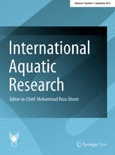
International Aquatic Research
Navigating the currents of aquatic biology and ecology.International Aquatic Research, published by the Islamic Azad University, Tonekabon Branch, is a vital open-access journal dedicated to advancing the field of aquatic sciences since its inception in 2009. With an ISSN of 2008-4935 and an E-ISSN of 2008-6970, the journal plays a significant role in disseminating high-quality research findings from Iran and around the globe. It covers a broad range of topics in aquatic biology, fisheries science, and marine ecology, making it a valuable resource for researchers, professionals, and students alike. As of 2023, it ranks in the third quartile (Q3) of the aquatic science category with a Scopus rank of #138 out of 247 in Agricultural and Biological Sciences, reflecting its growing influence in the field. With a commitment to promoting scientific knowledge and fostering collaboration among aquatic research communities, International Aquatic Research is positioned as an essential platform for those dedicated to understanding and conserving marine and freshwater environments.
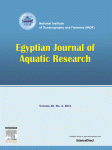
Egyptian Journal of Aquatic Research
Leading the way in aquatic research and ecological insights.Welcome to the Egyptian Journal of Aquatic Research, a premier peer-reviewed academic journal published by ELSEVIER, dedicated to advancing the field of aquatic sciences. With a robust impact factor and recognition as a Q1 journal in key categories such as Aquatic Science and Ecology, this open access journal has established itself as a vital platform for disseminating high-quality research since its inception in 2012. The journal aims to provide comprehensive coverage of topics including ecology, evolutionary biology, and water science, making it a crucial resource for researchers, professionals, and students engaged in these dynamic fields. With Scopus rankings placing it in the top echelons of various categories, the Egyptian Journal of Aquatic Research fosters innovation, collaboration, and knowledge dissemination on a global scale, making it an indispensable asset for anyone invested in understanding and preserving aquatic systems.

ENVIRONMENTAL BIOLOGY OF FISHES
Bridging ecological insights and fish conservation strategies.ENVIRONMENTAL BIOLOGY OF FISHES, published by SPRINGER, is a premier journal in the fields of Aquatic Science and Ecology, Evolution, Behavior and Systematics. With a rich history spanning from 1976 to 2024, this esteemed journal provides a platform for groundbreaking research that addresses critical issues such as fish ecology, species behavior, and environmental influences on aquatic life. Recognized for its significant contributions, it holds a Q2 ranking in both the Aquatic Science and Ecology categories, reflecting its influence and relevancy in the academic community. The journal's focus on innovative ecological studies makes it an essential resource for researchers, professionals, and students dedicated to advancing our understanding of fish biology and the broader ecological systems of which they are a part. Although not an open-access publication, the insights and findings presented in its articles are invaluable for those engaged in the preservation and sustainable management of aquatic environments.
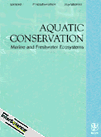
AQUATIC CONSERVATION-MARINE AND FRESHWATER ECOSYSTEMS
Advancing aquatic knowledge for a sustainable future.AQUATIC CONSERVATION-MARINE AND FRESHWATER ECOSYSTEMS, published by WILEY, is a premier international journal dedicated to advancing the understanding of aquatic ecosystems and their conservation. With an impact factor reflecting its significant influence and a distinguished position in the Q1 quartile across key categories such as Aquatic Science, Ecology, and Nature and Landscape Conservation, this journal serves as an essential resource for researchers and professionals engaged in the study and protection of marine and freshwater environments. Covering a broad array of topics, from ecosystem management to conservation strategies, the journal encourages the dissemination of innovative research and interdisciplinary perspectives. Although it is not an open-access publication, this journal is esteemed for its rigorous peer-review process, facilitating a platform where vital research influences policy and practice in the aquatic sciences. Established in 1991, AQUATIC CONSERVATION continues to be a cornerstone in the academic exploration and safeguarding of aquatic ecosystems through to its converged years of 2024 and beyond, providing a critical lens for the future of environmental sustainability.
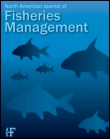
NORTH AMERICAN JOURNAL OF FISHERIES MANAGEMENT
Navigating the Challenges of Freshwater and Marine ResourcesNORTH AMERICAN JOURNAL OF FISHERIES MANAGEMENT, published by WILEY, is a premier peer-reviewed journal dedicated to advancing the science and management of freshwater and marine fisheries across North America. With an ISSN of 0275-5947 and E-ISSN of 1548-8675, this esteemed journal has been a crucial platform for innovative research from its inception in 1981 through to its anticipated evolution in 2024. The journal is recognized for its rigorous scholarship, evidenced by its impact in various categories with a Q2 ranking in Aquatic Science, Ecology, and Ecology, Evolution, Behavior and Systematics, as well as a Q3 ranking in the domain of Management, Monitoring, Policy and Law. Researchers and practitioners can access cutting-edge findings that address critical environmental challenges and promote sustainable fisheries management. With a consistent focus on ecological implications and policy development, this journal serves as an essential resource for those aiming to make a significant impact in fisheries science and management.

ICHTHYOLOGICAL RESEARCH
Bridging theory and practice in ichthyological science.Ichthyological Research is a prominent journal in the field of ichthyology, focusing on the biology, ecology, and conservation of fish species and their habitats. Published by Springer Japan KK, this journal has been a significant contributor to aquatic research since its inception in 1996 and will continue to disseminate cutting-edge findings through 2024. With an Impact Factor that places it within Q2 of the Ecology, Evolution, Behavior, and Systematics category, it ranks #318 out of 721 in Scopus, situating it in the 55th percentile of its field. This journal serves as a valuable resource for researchers, professionals, and students, offering open access to vital studies that drive forward our understanding of fish ecology and biodiversity. Located in Tokyo, Japan, Ichthyological Research aims to bridge gaps between theoretical research and practical application, emphasizing the conservation of aquatic ecosystems.

Fishes is a premier academic journal dedicated to the exploration and dissemination of cutting-edge research in the fields of aquatic science and ecology. Published by MDPI in Switzerland, this open-access journal has been accessible to researchers globally since its inception in 2016, allowing for the rapid exchange of knowledge that fosters scientific advancement in the study of fish and aquatic ecosystems. With its convergence in the years 2016 to 2024, Fishes proudly holds a notable position in the academic community, evidenced by its category quartile rankings of Q3 in Aquatic Science and Q2 in Ecology for 2023. The journal consistently features innovative research encompassing ecological interactions, conservation strategies, and evolutionary studies within aquatic environments. By integrating interdisciplinary approaches and encouraging contributions from a diverse array of experts, Fishes serves as an invaluable resource for researchers, professionals, and students alike, contributing to the understanding and preservation of our precious aquatic biodiversity.
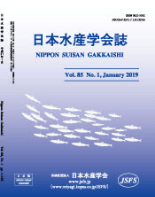
NIPPON SUISAN GAKKAISHI
Navigating the Waters of Aquatic DiscoveryNIPPON SUISAN GAKKAISHI, published by the Japanese Society of Fisheries Science, is a prestigious journal with a long history dating back to its inaugural issue in 1932. This journal, which spans key contributions to the field of Aquatic Science, serves as a vital platform for the dissemination of important research findings related to fisheries and aquatic biology, fostering knowledge and innovation in Japan and beyond. Although it is not an open-access publication, its rigorous peer-review process ensures the quality and integrity of the articles published. The journal is currently listed in the Q4 category for Aquatic Science according to the 2023 metrics, placing it within a niche but significant corner of the research landscape. With an ISSN of 0021-5392 and E-ISSN of 1349-998X, it continues to provide essential insights that benefit researchers, professionals, and students alike, highlighting advancements and challenges within aquatic ecosystems over a converged year span that continues to evolve through to 2024.